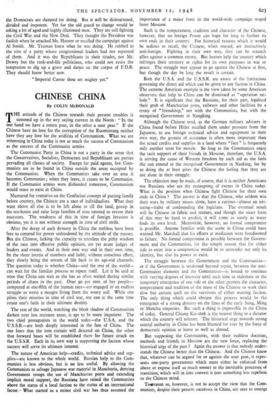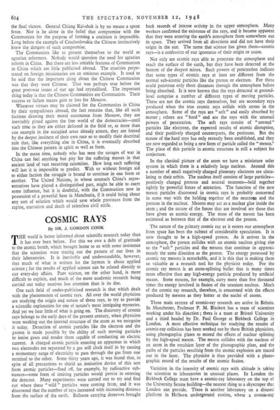CHINESE CHINA
By COLIN McDONALD
THE attitude of the Chinese towards their present troubles is summed up in the wry saying current in the North: " In the one hand we have a rotten pear, in the other a sour pear." If the Chinese have no love for the corruption of the Kuomintang neither have they any love for the aridities of Communism. What we are witnessing in China today is not so much the success of Communism as the success of the Communist armies.
The Communist Party in China is not a party in the sense that the Conservatives, Socialists, Democrats and Republicans are parties pervading all classes of society. Except for paid agents, few Com- munists are to be found in China outside the areas occupied by the Communists. When the Communists take over an area it becomes Communist ; when they leave, it ceases to be Communist. If the Communist armies were disbanded tomorrow, Communism would cease to exist in China.
Nurtured for centuries on the Confucian concept of putting family before country, the Chinese are a race of individualists. What they want above all else is to be left alone to till the land, gossip in the tea-house and raise large families of sons tutored to revere their ancestors. The weakness of this in time of foreign invasion is obvious, yet it is not without strength in time of civil strife.
After the decay of each dynasty in China the ruthless have been free to contend for power unhindered by the attitude of the masses. But the Chinese, lacking the capacity to translate the pithy wisdom of the race into effective public opinion, are yet acute judges of leaders and events. And in their own way and in their own time, by the sheer inertia of numbers and habit, without conscious effort, they slowly bring the stream of life back to its age-old channels. The question today is whether China—and the rest of the world— can wait for the familiar process to repeat itself. Let it be said at once that China can wait as she has so often waited during similar periods of chaos in the past. Over 90 per cent. of her people— computed at one-fifth of the human race—are engaged in an endless struggle to wrest a meagre living from the weary soil. While one pities their miseries in time of civil war, one can at the same time retain one's faith in their ultimate destiny.
The rest of the world, watching the bleak shadow of Communism darken over less resistant areas, is apt to be more impatient. The two chief protagonists in the world today—the U.S.A. and the U.S.S.R.—are both deeply interested in the fate of China. The one fears that the iron curtain will descend on China, the other that forward bases will be established there for future attack on the U.S.S.R. Each in its own way is supporting the faction whose success will serve its ultimate interest.
The nature of American help—credits, technical advice and sup- plies—are known to the whole world. Russian help to the Com- munists is• less obvious, but is no less useful. By allowing the Communists to salvage Japanese war material in Manchuria, denying Government troops the use of Manchurian ports and extending implicit moral support, the Russians have raised the Communists above the status of a local faction to the status of an international factor.• What started as a minor civil war has thus assumed the
importance of a major front in the world-wide campaign waged from Moscow.
Such is the temperament, tradition and character of the Chinese, however, that no foreign Power can hope for long to further its own ends in their country. For historical reasons which it would be tedious to recall, the Chinese, when roused, are instinctively anti-foreign. Fighting in their own way, they can be staunch allies against a common enemy. But heaven help the country which infringes their territory or rights for its own purposes in war or peace. The struggle may appear to go against the Chinese at first, but though the day be long the result is certain.
Both the U.S.A. and the U.S.S.R. are aware of the limitations governing the direct aid which can be given to any faction in China. The extreme American example is the view taken by some American observers that help to China can be dismissed as "operation rat- hole." It is significant that the Russians, for their part, legalised their grab of Manchurian ports, railways and other facilities by a treaty of " friendship," not with the Communists, but with the recognised Government in Nangking.
Although the Chinese tend, as the German military advisers in China found before Hitler recalled them under pressure from the Japanese, to use foreign technical advice and equipment in their own way, the gesture of assistance is often more important than the actual credits and supplies in a land where " face " is frequently only another term for morale. So long as the Communists enjoy the tacit support of their friends in Moscow, therefore, the U.S.A. is serving the cause of Western freedom by such aid as she feels she can extend to the recognised Government in Nanking, for by so doing she at least gives the Chinese the feeling that they are not alone in their struggle.
The objection may be made, of course, that it is neither Americans nor Russians who are the mainspring of events in China today. What is the position when Chinese fight Chinese for their own ends in China ? The answer is that the Chinese, who seldom win their wars by military means alone, have a curious—almost an irri- tating—habit of confounding the logicians. The eventual result will be Chinese in fabric and texture, and though the exact form of this may be hard to predict, it will come as surely as water finds its own level; Meanwhile, however, no formal compromise is possible. Anyone familiar with the scene in China could have warned Mr. Marshall that his efforts at mediation were foredoomed to failure. No formal compromise is possible between the Govern- ment and the Communists, for the simple reason that for either side to enter into a compromise would be to surrender not only its identity, but also its power to exist.
The struggle between the Government and the Communists— or if the Government is weakened beyond repair, between the anti- Communist elements and the Communists—is bound to continue with varying degrees of intensity until such time as stalemate or the temporary emergence of one side or the other permits the character, temperament and tradition of the mass of the Chinese to work their slOw but certain spell on the survivors of either warring faction. The only thing which could obviate this process would be the emergence of a strong dynasty on the lines of the early Sung, Ming or Manchu emperors. But such a thing is impossible in the China of today. General Chiang Kai-shek is the nearest thing to a dictator which the country will tolerate. The historical urge towards strong central authority in China has been blunted for ever by the force of democratic opinion at home as well as abroad.
But supposing the Communists, with their ruthless doctrine, methods and friends in Moscow are the new force, replacing the historical urge of the past ? Again the answer is that nobody under- stands the Chinese better than the Chinese. And the Chinese know that, whatever can be argued for or against the sour pear, it repre- sents one-party government which must either be enforced from above or expose itself so much sooner to the inevitable processes of transition, which will in time convert it into something less repellent to the Chinese mind.
To*eason so, however, is not to accept the view that the Com- munists, despite their present successes in China, are sure to emerge
the final victors. General Chiang Kai-shek is by no means a spent force. Nor is he alone in the belief that compromise with the Communists for the purpose of forming a coalition is impossible. Long before the example of Czechoslovakia the Chinese instinctively knew the dangers of such compromise.
The Communists like to present themselves to the world as agrarian reformers. Nobody would question the need for agrarian reform in China. But there are less amiable features of Communism in China which are little publicised abroad. The cruelties perpe- trated on foreign missionaries are an ominous example. It used to be said that the important thing about the Chinese Communists was that they were Chinese. That was perhaps true before the great post-war issues of our age had crystallised. The important thing today is that the Chinese Communists are Communists. Their success or failure means gain or loss for Moscow.
Whatever virtues may be claimed for the Communists in China by their sympathisers abroad, the fact remains that, like all such factions drawing their moral sustenance from Moscow, they are inevitably pitted against the free world of the democracies—until such time as they are either defeated in the field or, as more than one example in the occupied areas already attests, they are forced by the deeper instincts of their own race so to modify their doctrinal rule that, like everything else in China, it is eventually absorbed into the Chinese pattern in spirit as well as form.
In the mean time, nobody who has seen the ravages of war in China can feel anything but pity for the suffering masses in that ancient land of vast recurring calamities. How long such suffering will last it is impossible to predict. With or without foreign aid to either faction the struggle is bound to continue in one form or another. The United Nations, in whose counsels China's repre- sentatives have played a distinguished part, might be able to exert some influence, but it is doubtful, with the Communists now in possession of a powerful base in Manchuria, if it could bring about any sort of solution which would save whole provinces from the rapine, starvation and death of relentless civil strife.



































 Previous page
Previous page